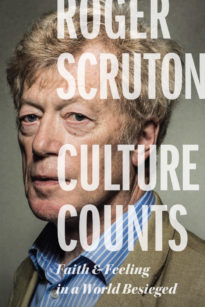Sir Roger Scruton discussed the political unrest in the West and its historical context, the puritanical nature of progressivism and attempts by its adherents to stifle dissenters, the imperative to defend free speech and a great deal more with our own Ben Weingarten. This interview was conducted on October 11, 2018, in advance of Encounter Books’ 20th Anniversary Gala. Watch below, where you can also find a full transcript of their discussion, slightly modified for clarity.
.
Ben Weingarten: We are meeting today in fortuitous times for this interview, but also perilous times here in America. You have U.S. senators and a former attorney general openly, in effect, and sometimes directly, inciting violence with their rhetoric. We just went through a confirmation process for the Supreme Court in which the ideas of due process and presumption of innocence went out the window for a large percentage of the country. On top of that, there’s been a resurgence in socialism, and I see a parallel here in what we’re witnessing in America to what you witnessed in France in May of 1968, which you…described as the time in which you were led to conservatism. I wonder if you’d comment on that.
Sir Roger Scruton: Well, yes. There is something similar definitely happening, in that there’s a loss of any sense of the legitimacy of the inherited political order, and the inherited procedures, and how things have been done, no longer has any authority on the country. Because it has been done, that’s a reason for their not doing it again. All that innovation without knowledge has taken over. And I’m not sure that there is any alternative that people are contemplating. As you say, there is a lot of socialist rhetoric, but it’s completely detached from the kind of substantial theories of society and its development that were given by Marx, and which were accepted by the revolutionaries of 1968 in Paris. Here it is simply uneducated rhetoric, but it has a lot of power.
Ben Weingarten: Would you say that this is just another manifestation of that tension in Western history between the French Revolution and the American Revolution, or is this time truly different?
As you say, there is a lot of socialist rhetoric, but it's completely detached from the kind of substantial theories of society and its development that were given by Marx, and which were accepted by the revolutionaries of 1968 in Paris. Here it is simply uneducated rhetoric, but it has a lot of power.
Sir Roger Scruton: I don’t think it’s quite as serious as that, to be quite honest. The American Revolution produced a permanent way of dealing with things. However the Constitution has been adapted and changed over the two centuries, it’s still there, and it still is a solid point to which people refer when wanting to introduce changes. The recent fracas over the appointment to the Supreme Court of Judge Kavanaugh — that I think is not necessarily part of a movement. It’s certainly not an attempt to move in the direction of the French Revolution. The French Revolution when it was first announced and first put into action with the Declaration of Human Rights — human and civil rights — was based on the American. It was an attempt to reproduce here what people had seen to be produced in America. But it degenerated almost immediately because it was an attempt to impose Anglo-Saxon sense of due process onto a monarchical and hierarchical form of government, so it immediately led to collapse. And in the wake of that collapse, the terror and the loss of two million lives, it was something that’s inconceivable here in America, I think.
Ben Weingarten: Part of it is — and you saw this in the French revolution and you certainly see it today — is the rejection of our Judeo-Christian heritage, and the values and principles that have been passed down through generations. And you see that today in progressives in particular, who essentially reject all the things that Western Civilization is based on, and almost seem to hold their progressivism as a secular religion. I wonder what you make of that assertion.
Sir Roger Scruton: Well, it’s certainly true that there’s a distinction between the political approach to problems and the religious. In a religion, the first necessity is to persecute the heretic. You can observe that in the French Revolution, you observe it in the Russian Revolution, and you observe it on the Left today, certainly that you mustn’t step out of line. If you do, you’re in real trouble. Whereas the political approach, as we Anglo-Saxons have understood it down the centuries, has been an approach of dialogue, where you try to resolve differences through conciliation and through understanding the problem and suggesting a remedy. [It’s a] completely different approach.
Ben Weingarten: What would you suggest is the single most effective argument, single most powerful argument for conservatism, especially for younger Americans who completely reject it out of hand and probably have no sense as to what it actually really means?
Sir Roger Scruton: Well, the single most powerful argument is to look around you at what you have and compare it with the rest of the world, and soon you will understand that we are rather intelligent to conserve it rather than to destroy it. Look at history. I know young people don’t look at history very much, but look at what happens when people think that they only have to pull down all the things that irritate them and something beautiful will come in their place. On the contrary, you pull things down easily, but nothing comes in their place.
In a religion, the first necessity is to persecute the heretic. You can observe that in the French Revolution, you observe it in the Russian Revolution, and you observe it on the Left today, certainly that you mustn't step out of line
Ben Weingarten: Earlier, you alluded to the political approach where we put our chips down on the table and we say, “These are our best arguments. Show us your best arguments and we have a reasoned debate and we come to a conclusion.” And you live to fight another day, but there’s still civility and comity. Tonight, we’ll be celebrating an event, associated with Encounter Books. And Encounter magazine was a predecessor to Encounter. Encounter Magazine existed to further Western culture, Western civilization, and to fight against those who would challenge it. I wonder if you’d speak a little bit to the significance of Encounter Magazine in that intellectual battle.
Sir Roger Scruton: Right. Well it was a very lonely magazine in the British context of the day, interestingly enough edited by an American. And it was an attempt really to give the intellectual backing to a positive vision of Western civilization in the face of what was then a malign external threat, which was the Soviet threat. And our intellectuals on the Left were deliberately mis-describing the Soviet Union as some kind of alternative to the West, which would safeguard people’s freedom, but nevertheless also introduce the necessary social justice. And so we lived in a culture of lies, in which the truth about the gulag was never mentioned, in which the Soviet Union was treated as an ordinary international citizen so to speak, which could be brought to the table just like any other. And Encounter was very important in pointing out the falsehood of that, making it clear that for instance, you couldn’t publish a magazine like Encounter in the Soviet Union; that there wasn’t free opinion, free speech; that there wasn’t an open discussion; and that the major artists and writers of that country were themselves suppressed or rotting away somewhere in Siberia.
Ben Weingarten: And you’ve written about the fact that intellectuals historically, and of course to this present day, have disproportionately leaned Left in their political ideology. And the same goes for our cultural elites, those who create content, those who entertain us. So it’s very difficult then, you have the trickle down of the ideas from the elites, down to the public, and then you have it being amplified through bread and circuses, primarily circuses, on the cultural side. Why is it that the cultural elite, the intellectual elite, always tend to be disproportionately Left? And is there an antidote to it, or how do we break them out of that mold?
Sir Roger Scruton: It’s a very important question, and I wish I knew the answer to it. I think it’s been so since the Enlightenment, it’s not a new thing. But of course we have very major intellectual and cultural figures on the right as well, from Edmund Burke and Hegel onwards right down to T.S. Elliot who have resisted this, and actually, they are, in the long run, turn out to be the greater figures. But they are a minority. I think if you look back to the Reformation and the world of Shakespeare, then you’ll…encounter a culture which was not left-leaning at all, which was based on a realistic understanding of the human condition, and also a fundamentally religious conception of what human society is. But when you’ve lost religion, as most of our societies today have, what is lost…is a coherent possession of the people as a whole. Then there’s inevitably this need for a substitute religion, and the doctrine of equality is a facile way of re-creating religious comfort without belief.
Ben Weingarten: Now, for articulating just these kinds of beliefs, you have become a thought criminal in Europe. There’s been an effort to “no-platform” you because you expose views that are considered beyond the pale. I wonder if you’d speak a little bit to that experience.
Sir Roger Scruton: Well yes, this was some time ago when I was a university professor, and I normally expected to be “no-platformed,” that’s absolutely true, during the 1980s. I left the university in 1990. So I haven’t had that experience since, although here and there, if I do talk in a university, there can be trouble. But there’s not serious trouble these days. And what was interesting was that I was regarded as persona non grata by student bodies in Britain because I was editor of a conservative magazine, Salisbury Review, which defended policies about immigration, namely that it should be controlled, the immigrants should be encouraged to integrate, and all those things — policies which now everybody accepts. But at the time, 20, 30 years ago, it was regarded as so shocking that I should not be allowed to disgrace a university by my presence, that it was actually quite violent. I had to have police protection. I don’t know why I went around still giving the talks — it was quite pointless. But something in me persuaded me that I should nevertheless, having published a journal which said these things, submit myself to the necessary punishment.
The doctrine of equality is a facile way of re-creating religious comfort without belief
Ben Weingarten: Do you believe that there is some seed in the West of its own destruction? That we are self-righteously suicidal, we being the progressives who dominate in society, such that we’re in an inexorable decline in which we will self-immolate because we believe that is right, good, just, virtuous?
Sir Roger Scruton: I think that’s an interesting suggestion, and lot of people have written about the suicide of the West obviously. And actually, if you look at what Gibbon wrote about the decline and fall of the Roman Empire, it’s quite clear, that was a suicide too. That may be there is a finite gift of cohesive energy that keeps a civilization going, and when that store of energy is depleted, there is then this moment of weakness, when you, as it were, turn on yourself the accusations that you ought to be turning on others. And you meekly surrender to your fate. I don’t think we’ve got to that stage yet because I think the mass of ordinary people would resist this. And people are strongly aware, given the massive communication in the world today, that actually it would be better if we weren’t like everywhere else. I think most people who criticize America vigorously are not prepared to do what their words suggest and migrate to Iran, and in their hearts they know that it’s better here. But of course one of the things that’s good about being here is that you can criticize it. And you can make a reputation by being the scourge of the establishment. You can’t make a reputation that way in Iran.
Ben Weingarten: Given your experience in the academy and what we’ve seen in subsequent decades, how do we restore not only true academic freedom, but also a belief in instilling a true classical education once again?
Sir Roger Scruton: Well, it’s a very difficult question because the universities enjoy enormous privileges, huge financial benefits and a kind of infrastructure that they’ve inherited from centuries of charitable giving from old alumni, and of course until very recently, they really were treasure houses of knowledge, and culture and social understanding. It’s only recently that they’ve begun to collapse. And it’s very difficult to know how to rectify this, given that the entire staff seem to be on the side of destruction. But in America, you do have the Liberal arts college. You can start other things. You can offer alternative kinds of education. Many people believe that perhaps the internet could be used to educate people at home or while they’re doing their job, and that that might take over from universities. I mean, universities are very expensive and it cost you what? It’s $300,000 to give your child an education at Yale or Harvard. And if the only result of that is that he or she comes out totally alienated towards the surrounding society and without any genuine culture, what’s the point?
Ben Weingarten: In total contravention of what those institutions were built on in the first place.
Sir Roger Scruton: Yes, of course.
Ben Weingarten: You’ve written in the past that we’ve been living under a regime of liberal censorship — or perhaps it’s illiberal censorship today. And of course, once we lose our ability to speak freely, think freely, the First Amendment falls in the U.S., everything else falls. It’s the same in the rest of the Western world, as well. As individuals, what is the single most important thing we can do, The single most influential thing we can do to preserve our Western way of life in the face of those who wish to ultimately destroy it?
Sir Roger Scruton: Well, obviously free speech is one of the battles that we have to fight, and freedom of religion also, and they’re both united of course, in the first clause of the American Constitution. And it’s difficult to know what policy to pursue in order to defend free speech. But then one suggestion is that we should speak freely. And if people try to shut them up, shut us up, repeat what we’ve said — and to face people down, this is what is not done. People start apologizing, immediately, and in the face of a culture where it’s not giving offense that matters, but taking offense. We’ve got…whole academic disciplines like Gender Studies designed to cultivate the art of taking offense, even when no offense is being given. But why not give offense, in those circumstances?


